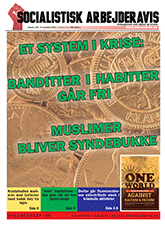Tema: Strategi og taktik
Se også: Se også: Venstrefløj - teori
- Strategi og taktik
Se også: Venstrefløj - teori - Stathis Kouvélakis: Feedback: Facing the crisis: the strategic perplexity of the left
International Socialism Journal nr. 130, apr 11 – side 171
Note: Everyone knows the joke that, of the last three crises, Marxists have predicted at least five. What the joke doesn’t say is that they failed to predicted a sixth, their own crisis, to which I will devote these remarks. To put it differently I will focus on the political aspect of the crisis, because, it seems to me, it is at this level that the contradictions of the economy are concentrated and that their ultimate resolution is decided.
- What Socialists Say: Can non-violent action bring about change?
Socialist Worker nr. 2236, jan 11 – side 9
Note: Can we beat the state with non-violent methods? This is the question that emerges in many mass movements and has come up most recently during the student protests and the Tunisian revolt.
- Grace Lally: Feedback: Discussing the alternatives
International Socialism Journal nr. 129, jan 11 – side 209
Note: In the last issue of this journal Alex Callinicos invited discussion on the kinds of demand that might provide a “complete” and “universally valid” transitional programme for revolutionaries today. This is somewhat of a new departure for the Socialist Workers Party (SWP) and most certainly requires more consideration by party members than I can give it here, but I want to take issue with a number of the points he makes.
- Ben Wray: Organising for revolution: Strategy and tactics – what’s the difference?
Socialist Worker nr. 2161, jul 09 – side 6
Note: In the first part of our new series Ben Wray looks at debates in the socialist movement in the 20th century
- Daniel Bensaïd: The return of strategy
International Socialism Journal nr. 113, jan 07 – side 139
Note: Daniel Bensaid is a leading member of the Ligue Communiste Révolutionnaire (LCR) in France. This article takes up issues arising in a discussion on revolutionary strategy to be found in the LCRs theoretical journal Critique Communiste in March 2006 and continued at a seminar in Paris in June.
- Duncan Hallas: What Do We Mean by: Sectarianism
Note: The term sectarianism is used so loosely that it may be as well to start by clarifying what it does not mean.
(From the collection, What do we mean by ...?, Education for Socialists No.6, March 1987.)
- Charlie Lywood: Teori for bevægelsen: Radikalitet og massebevægelse
Socialistisk Arbejderavis nr. 245, sep 05 – side 8
Note: Radikalitet og Masseaktion bliver ofte opstillet som modsætninger af folk på venstrefløjen. Charlie Lywood argumenterer her for at de to ting nødvendigvis må gå hånd i hånd, og tager et kritisk blik på, hvordan dette foregår i praksis.
- Chris Harman: Anti-capitalism five years after Seattle: Spontaneity, strategy and politics
International Socialism Journal nr. 104, sep 04 – side 3
Note: Seattle, Porto Alegre. Gothenberg, Genoa, Barcelona, Florence, 15 February 2003, Paris, Mumbai and now London. The anticapitalist movement born just five years ago has merged into the antiwar movement to produce some of the biggest protests the world has ever seen. And in Latin America, mass upsurges have shaken the system in Ecuador, Argentina, Venezuela, and Bolivia. But the very growth of the movement has thrown up new problems and resurrected very old arguments about strategy. Chris Harman looks at these and challenges those who believe revolutionary organisation is neither necessary nor desirable.
- John Rees: Socialism in the 21st century
International Socialism Journal nr. 100, sep 03 – side 3
Note: A generation of neo-liberal policies has profoundly altered the lives of ordinary people, the workings of the state and the nature of imperialism. John Rees, editor of International Socialism, charts these changes and the impact they have had on strategies for liberation. He argues that the fundamental question of reform or revolution, while posed in new contexts, still needs to be tackled for anti-capitalists to achieve their goals.
- Murray Smith: The broad party, the revolutionary party and the united front: a reply to John Rees
International Socialism Journal nr. 100, sep 03 – side 65
Note: New Labour's crumbling support provides real opportunities for socialists. But what forms of organisation should we employ? Murray Smith uses the experience of the Scottish Socialist Party to reply to John Rees's contribution to International Socialism 97 about this vital debate.
- Murray Smith: Where is the SWP going?
International Socialism Journal nr. 97, dec 02 – side 39
Note: ANTI-CAPITALISM has given rise to a renewed debate about the future of the left. The rightward shift of Labourism has created a political vacuum that the left now has to try and fill. But what kind of socialist organisation is now needed to fulfill this task? Murray Smith and Nick McKerrell have both recently addressed this issue from the standpoint of the Scottish Socialist Party. John Rees acknowledges the success of the SSP, especially in the electoral arena, but responds to their arguments by reasserting the relevance of both the revolutionary party and the tradition of the united front.
- John Rees: The broad party, the revolutionary party and the united front
International Socialism Journal nr. 97, dec 02 – side 57
Note: ANTI-CAPITALISM has given rise to a renewed debate about the future of the left. The rightward shift of Labourism has created a political vacuum that the left now has to try and fill. But what kind of socialist organisation is now needed to fulfill this task? Murray Smith and Nick McKerrell have both recently addressed this issue from the standpoint of the Scottish Socialist Party. John Rees acknowledges the success of the SSP, especially in the electoral arena, but responds to their arguments by reasserting the relevance of both the revolutionary party and the tradition of the united front.
- August Nimtz: Class struggle under 'Empire': in defence of Marx and Engels
International Socialism Journal nr. 96, sep 02 – side 47
Note: MARX'S ACCOUNT of socialist organisation and its role in the class struggle is given a brilliant outline by August Nimtz in a piece that is simultaneously a critique of Toni Negri and Michael Hardt's "Empire". Nimtz draws on his pioneering work in his recent book, "Marx and Engels: Their Contribution to the Democratic Breaktbrough".
- Jørn Andersen: Leon Trotsky: "A Program for France" (1934): Trotskijs aktionsprogram: Fra isolation til revolution
Socialistisk Revy nr. 11, jan 99 – side 16
Note: "Situationen i Frankrig stiller hele den bevidste arbejderbevægelse over for en opgave med et kort perspektiv: Enten vil proletariatet i løbet af 6 måneder, et år eller måske de kommende to år, tilintetgøre fascismen og tage et voldsomt skridt fremad, helt frem til kampen om magten, eller det vil selv blive tilintetgjort, og hele Europa vil blive skueplads for fascistisk tyranni og krig."
- Ellen Meiksins Wood: A reply to ‘Looking for alternatives to reformism’
International Socialism Journal nr. 35, jun 87 – side 129
Note: Reply to review in ISJ2:34
- Alex Callinicos: A rejoinder to Wood
International Socialism Journal nr. 35, jun 87 – side 139
Note: Reply to reply in this issue to review in ISJ2:34
- Alex Callinicos: Looking for alternatives to reformism
International Socialism Journal nr. 34, dec 86 – side 106
Note: A review of Ellen Meiksins Wood, The Retreat from Class: A New ‘True’ Socialism (Verso, 1986)
No sane observer of the British political scene could doubt that the current is pulling rightwards inside the labour movement. The New Statesman recently described the hard left inside the Labour Party as ‘the dog that did not bark’: ‘Labour’s Left has, since the near miss of Tony Benn’s attempt at the party’s deputy leadership in 1981 and even more since the electoral debacle of 1983, declined to the point of near invisibility’.
- Freddie Nielsen: Spørgsmål vi ofte møder: Bliver I dog aldrig enige?
Socialistisk Arbejderavis nr. 24, nov 86 – side 4
Note: Gang på gang bliver vi stillet overfor spørgsmålet: “Hvorfor er der så mange arbejderpartier?” og: “Hvorfor kan venstrefløjen ikke enes?”
- Alex Callinicos: Politics or abstract propagandism
International Socialism Journal nr. 11, dec 80 – side 111
Note: Marxism, as they say, is a guide to action. One of the greatest problems for revolutionary socialists lies in conditions where not even a significant minority of workers is prepared to accept their guidance. This has been true in Britain for much of its history.
- Archive: Comintern Theses on Nationalisation and State Capitalism
International Socialism Journal nr. 2, sep 78 – side 71
Note: Revolutionaries today face a problem. The long drawn out economic crisis means that again and again we are faced with the struggle against redundancies and factory closures. Individual firms – even giant firms – reach the brink of bankruptcy. There is no way they can keep going on a capitalist basis without vast cuts in the workforce and the pumping in of huge subsidies by the state. The demand of workers for jobs comes right up against the limits of the present organisation of the economy. Yet the old demand for going beyond those limits – the demand of nationalisation – often seems inadequate.
- Ian Birchall: Book Review: Socialism and Revolution
International Socialism Journal (1st series) nr. 79, jun 75 – side 39
Note: André Gorz: Socialism and Revolution, Allen Lane, £4.50.
Der blev fundet 21 artikler
Til hovedgruppe – Til temaoversigt
- Leder: Det mener vi
- Interview: Kampen mod umenneskelige fængslinger af afviste asylansøgere nytter noget
- Udenlandske chauffører har usle vilkår i Danmark
- “Grøn” kapitalisme – kun grøn, når der kan tjenes penge
- Derfor går finansverdenens nålestribede amok i kriminelle aktiviteter
- 1968: Året der forandrede alting
- Mere end en Saudi PR-katastrofe
- To år med Trump har mobiliseret millioner til modstand
- Almindelige menneskers historie: 3. De første store stater og de første klassekampe



 Newsfeed
Newsfeed